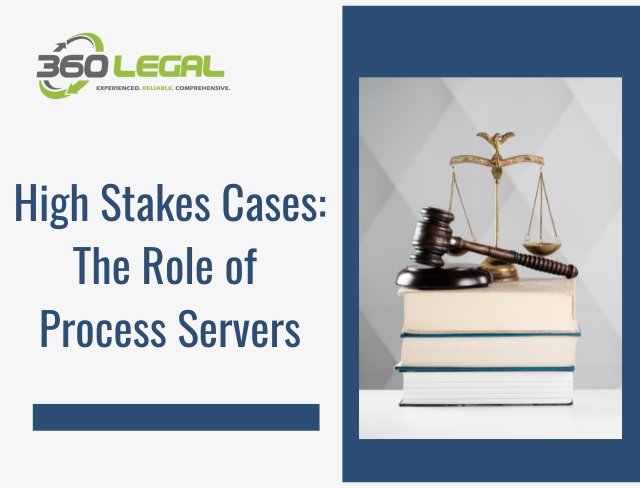Testing RSS Feeds.. ignore post.
Testing RSS Feeds.. ignore post.
High Stakes Cases: The Role of Process Servers

In high-stakes legal cases, every detail counts, and ensuring documents are correctly and timely served is no exception. Process servers play a pivotal role, ensuring that the legal process runs smoothly and all parties receive the necessary legal documents in adherence to the law. In this article, we explore the significance of process servers in high-stakes cases, their responsibilities, the challenges they face, and how their services contribute to the legal system’s integrity.
Importance of Timely and Correct Service of Process
Timely and correct service of process is the bedrock of effective legal proceedings. This crucial step in the judicial process involves notifying individuals or entities about legal actions or proceedings against them, allowing them the opportunity to respond appropriately. The importance of this cannot be overstated; any delays or errors in the service of process can lead to significant consequences, including the dismissal of a case, unnecessary prolongation of litigation, and injustice. Efficient process servers ensure that legal documents are delivered to the right parties, within the stipulated time frame, adhering to the laws and regulations governing the service of process. Their role in ensuring timely and correct service of process safeguards the integrity of the legal system promotes fairness in legal proceedings, and protects the rights of individuals, preventing undue harm from delays or oversight in legal notifications.
Responsibilities of Process Servers in High-Stakes Cases
Process servers in high-stakes cases have a heightened responsibility. They are tasked with ensuring that legal documents such as subpoenas, complaints, and summons are delivered to the right individuals, following all state and federal laws, and providing proof of service. This responsibility is pivotal for upholding the legal process’s integrity and ensuring that the case progresses without unnecessary delays or complications.
Challenges Faced by Process Servers
Despite their critical role, process servers often encounter various challenges, including locating the individual to be served, dealing with uncooperative recipients, and ensuring their safety while performing their duties. In high-stakes cases, these challenges may be amplified, requiring additional diligence and professionalism from process servers.
The following is a DRAMATIZATION AND IS NOT AN ACTUAL EVENT: Imagine a high-profile case involving a multinational corporation accused of fraudulent activities. Due to the sensitive nature and the significant financial implications involved, it’s vital for all legal documents to be accurately and timely delivered to all involved parties. John Doe, a process server with years of experience, is tasked with serving a subpoena to the corporation’s elusive CEO. The CEO has been avoiding service, aware that the legal notice could tarnish his reputation and impact the company’s stock prices.
Understanding the gravity of the case and his responsibility, John embarks on a meticulous plan to serve the documents. Leveraging his vast network and resources, he locates the CEO and strategically serves the subpoena without any confrontation, ensuring the legal process continues unhindered. John’s precision, professionalism, and commitment to his role as a process server play an instrumental part in upholding the legal system’s sanctity in this high-stakes case.
Impact on the Legal System
Process servers’ diligent work in high-stakes cases significantly impacts the legal system. Their services ensure that all parties are duly notified about legal proceedings, upholding individuals’ rights and contributing to fair and just outcomes. Despite the challenges they face, their commitment ensures that the legal process is not compromised, solidifying their role as an essential component in the justice system.
Upholding the Right to Due Process
The most immediate impact of process servers on the legal system lies in their role in upholding the constitutional right to due process. The U.S. Constitution guarantees that no person shall be deprived of life, liberty, or property without due process of law. A key component of due process is ensuring that individuals have notice and an opportunity to respond to legal actions against them. Process servers are vital in this regard, ensuring that legal documents are delivered to the appropriate parties in a timely manner, thus allowing them the chance to prepare and present their case.
Ensuring Timely Legal Proceedings
One of the significant impacts of process servers in the legal system is ensuring that legal proceedings occur timely and efficient. By ensuring the prompt delivery of legal notices, process servers help to prevent unnecessary delays in legal proceedings. These timely deliveries are crucial in high-stakes cases where every second counts and delays can have significant legal, financial, and reputational implications for the parties involved.
For instance, in civil litigation involving substantial monetary claims, delays in the service of process can postpone legal proceedings, causing further financial strain on the parties involved due to ongoing legal fees, and potentially allowing wrongdoers to continue harmful activities unimpeded. Process servers help to mitigate these issues, contributing to the efficiency and timeliness of legal proceedings.
Contributing to Fair and Just Outcomes
Process servers also play a vital role in contributing to fair and just outcomes in the legal system. By ensuring that all parties receive proper notice of legal actions and proceedings, process servers enable parties to respond and present their side, contributing to a more balanced and equitable legal process. This is especially significant in high-stakes cases, where the stakes are high for everyone involved. For example, in a high-profile criminal case, the defendant’s right to a fair trial is maintained by ensuring they are properly served with notice of the charges and proceedings against them.
Enhancing Accountability
Process servers enhance accountability within the legal system by ensuring that individuals and entities cannot evade legal proceedings. By locating and serving legal documents to individuals who may be trying to avoid legal actions, process servers ensure that parties are held accountable for their actions and cannot evade the legal process. This is particularly crucial in high-stakes cases, where individuals or entities might go to great lengths to avoid legal action, given the significant implications involved. Process servers’ expertise and diligence in effectively serving legal documents ensure that evasion is minimized, and parties are brought before the law.
Conclusion
In conclusion, process servers hold a crucial position, especially in high-stakes cases where the timely and correct delivery of legal documents is paramount. Their responsibilities extend beyond mere delivery, ensuring the upholding of legal standards and contributing significantly to the legal system’s overall efficiency and fairness. While they navigate various challenges, their commitment and professionalism ensure that justice is not hindered, reaffirming their indispensable role in high-stakes legal proceedings. In the intricate web of legal proceedings, process servers emerge as unsung heroes, working diligently behind the scenes to ensure the seamless progression of cases, safeguarding the legal system’s integrity and reliability.
Author
We are Social!
Latest tweets
Popular Tags
Testimonials
"5 star service ! prompt serving, helpful, professional . "
"Mike is awesome. Our firm has hired him on several occasions and we are very happy with his work. His prompt serving, helpful, professional and always in communication. I recommend him highly! "
"360Legal provides speedy and easy to use Process Service that is flexible, and very transparent with nearly instant reporting. It is very helpful for us to be able to track the status of our process service jobs, especially when they are time sensitive. "
Latest News
-

RMAI 2021 Annual Conference RMAI Annual Conference
April 12-15, 2021 -

NATIONAL CREDITORS BAR ASSOCIATION 2020 SPRING CONFERENCE
May 19-21, 2021 -

ALFN ANSWERS 2021
Jul 18-21, 2021 -

Annual Convention and Expo
Oct. 17-21, 2021 -

Florida Association of Professional Process Servers 33rd Quarter Board Meeting/Professional Beach Getaway
Aug. 20-22, 2021












